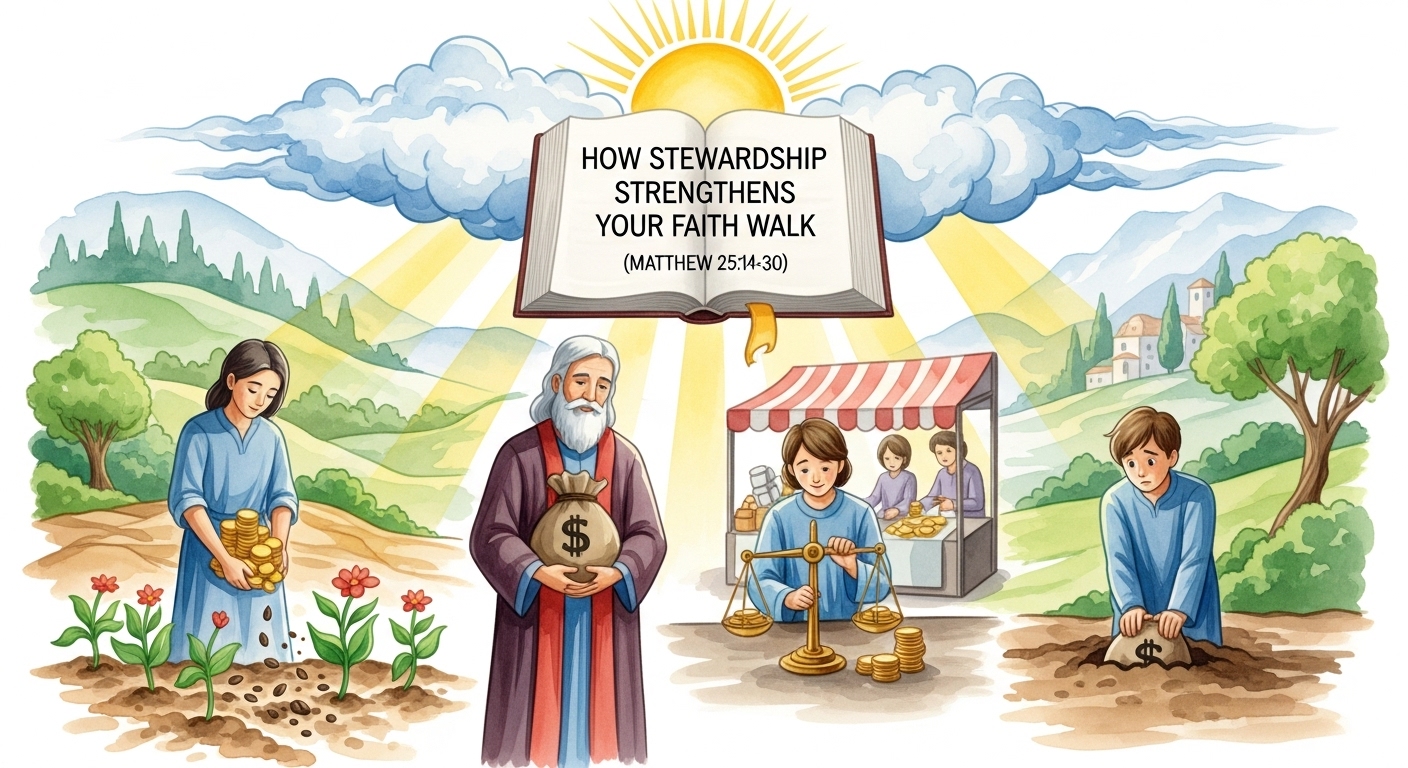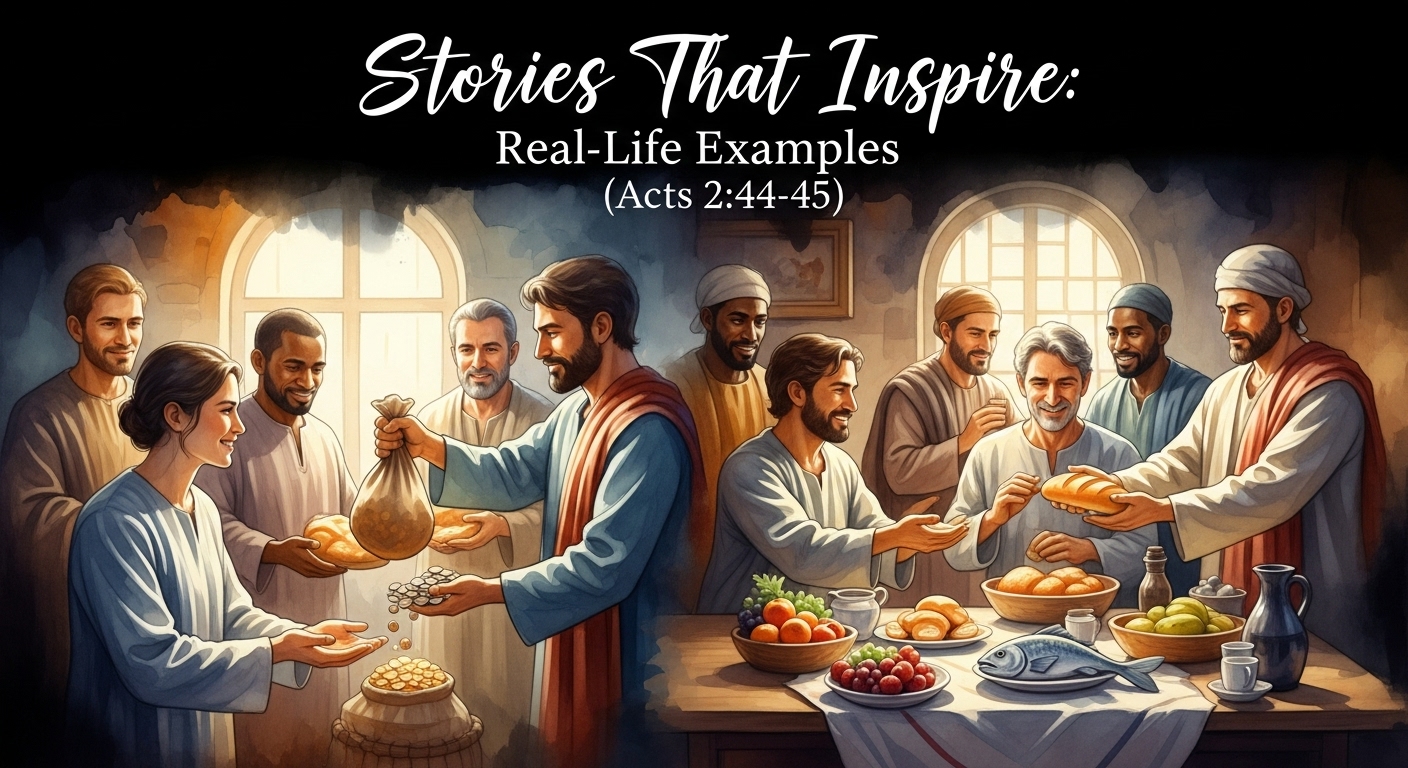How Stewardship Strengthens Your Faith Walk
You probably know that faith isn’t just something you hold in your mind — it’s a way you live. When you talk about Christian stewardship, you’re tapping into a daily rhythm that shapes how you use everything God has given you: time, talent, treasure, and testimony. This article walks with you through the biblical foundations, practical applications, and spiritual benefits of stewardship so you can see how it strengthens your faith walk. Expect scripture, real-world practices, and reflective questions you can use today.
What Christian Stewardship Really Means
Christian stewardship often gets reduced to giving money, but it is much broader. It’s the faithful management of all God-given resources in a way that honors Him, serves others, and advances His kingdom. You steward your work, relationships, skills, possessions, and even your body. Practically, that means viewing your life as God’s loan to you rather than something you own outright, and responding accordingly.
Biblical Foundations for Stewardship
The Bible lays a foundation for stewardship that touches every part of life. From the parable of the talents to instructions about cheerful giving, Scripture consistently frames resources as entrusted to you by God. When you read passages like the parable of the talents, you see stewardship modeled as responsibility, accountability, and reward. These biblical principles shape how you approach daily decisions and long-term priorities.

Matthew 25:14-30 anchors the teaching about responsibility. It reminds you that what you’re given isn’t ultimately for your possession but for your faithful use.
Stewardship and Spiritual Maturity
Christian stewardship is a training ground for spiritual maturity. When you make choices about generosity, time, and service, you’re exercising spiritual muscles like trust, gratitude, and humility. The more you practice faithful stewardship, the more your character aligns with Christ’s.
Luke 16:10-13 reinforces that faithfulness in small things leads to faithfulness in greater responsibilities. Your faith grows when you consistently act on that principle.
Stewardship as Worship
Stewardship is worship because it’s an outward expression of your inward devotion. How you allocate your resources reveals what you treasure. When you give, serve, or prioritize God-honoring choices, you’re declaring with your life that God has first place. This daily obedience becomes a form of continual praise.
Proverbs 3:9-10 invites you to honor God with your wealth, connecting reverence for God to practical stewardship.
Faith and Trust: Linking Stewardship to Dependence on God
Making stewardship central to your life pulls you into dependent trust. When you give or serve sacrificially, you expose your heart to the possibility of lack and rely on God’s faithfulness instead of your resources. This posture deepens your reliance on God’s provision and strengthens your faith when you see His faithfulness in return.
Matthew 6:19-21 helps you reframe where you store value — in heaven rather than on earth — which naturally shifts your trust from material security to spiritual realities.
Stewardship Shapes Daily Discipleship
Discipleship is about following Jesus with your whole life, and stewardship is the daily discipline that integrates faith into every action. Whether you’re budgeting, deciding how to spend your time, or choosing projects at work, stewardship helps you filter decisions through a kingdom perspective. Over time, those small decisions add up and mark you as a disciple.
Colossians 3:23-24 connects the ordinary work you do with service to the Lord, reminding you that stewardship includes excellence in your everyday responsibilities.
Stewardship and Generosity: How Giving Grows Faith
Giving is one of the clearest expressions of Christian stewardship. It moves you from hoarding to trusting, from inward focus to outward care. When you give, you participate in God’s work — meeting needs, supporting ministry, and proclaiming the gospel. The habit of generosity forms you spiritually: it builds compassion, reduces materialism, and reveals God’s provision.
2 Corinthians 9:6-8 encourages you to give cheerfully and promises that God will enrich you so you can continue to be generous, tying generosity directly to spiritual blessing.

Stewardship Beyond Money: Time, Talents, and Influence
Christian stewardship extends to how you use your time and gifts as much as how you use money. Your schedule, your skills, and your social influence are resources God expects you to manage wisely. You can be generous with time by serving, invest your talents in mentorship, and use influence by advocating for justice and truth. These are all stewardship practices that shape your faith and witness.
1 Peter 4:10-11 urges you to use whatever gifts you have to serve others as faithful stewards of God’s grace, linking gifts directly to stewardship responsibilities.
Practical Habits for Developing Stewardship
You can cultivate stewardship through practical habits: budgeting, setting aside time for service, regular prayer about finances and priorities, and accountability with trusted friends. Create rhythms that help you exercise faithful management, such as monthly giving plans, volunteering schedules, and regular stewardship reflections. Over time, these habits shape both behavior and character.
Simple habits — like setting up automated giving or scheduling regular “margin” time in your calendar — make stewardship practical and sustainable in your daily life.
The Role of Accountability and Community
You weren’t meant to steward alone. Community provides perspective, encouragement, and correction. Sharing your stewardship goals with a trusted friend or small group brings accountability that helps you remain faithful. Churches and ministries also provide structures where your stewardship can be multiplied and directed for kingdom impact.
Hebrews 10:24-25 highlights the importance of gathering and encouraging one another, which naturally supports faithful stewardship within the community.
Handling Fear and Control in Stewardship Decisions
Fear and the desire for control often undercut stewardship. You might cling to resources because you’re afraid of scarcity or uncertain about the future. Learning to surrender control is central to strengthening your faith walk. You don’t need to be reckless, but you do need to be willing to trust God more than your own planning.
Luke 12:22-34 speaks to anxiety over provision and prompts you to seek God’s kingdom first, a mindset that recalibrates stewardship toward trust instead of fear.
Stewardship When Life Is Messy: Debt, Loss, and Uncertainty
Stewardship doesn’t require perfect circumstances. You steward in the middle of debt, loss, and uncertainty, and those seasons can be especially fertile for spiritual growth. When resources are limited, you’re forced to be creative, prioritize, and deepen your reliance on God. Stewardship in tough seasons can refine your faith and reveal new ways to serve.
Romans 8:28 is a reminder that God works through all circumstances, and that stewarding faithfully in hardship aligns you with His purposes.
Teaching the Next Generation Stewardship
You shape others by how you steward. Modeling generous living, explaining the reasons behind your choices, and involving children in giving and service teach the next generation to value God’s priorities. Intentional teaching on stewardship prepares younger believers to view resources through a kingdom lens early in life.
Deuteronomy 6:6-7 instructs you to teach God’s commands to your children in daily life — stewardship is a perfect practical outworking of that command.

Stewardship, Sacrifice, and Joy
Stewardship often involves sacrifice, and sacrifice can lead to deep joy. The act of surrender — whether it’s of money, time, or reputation — opens you to the joy of participation in God’s redemptive work. You discover that giving doesn’t bankrupt you spiritually; it enlarges your heart and draws you closer to God and others.
Mark 12:41-44 shows the surprising example of joy in sacrificial giving: the widow who gave all she had, illustrating that stewardship can be an act of trust and worship even when resources are small.
Stewardship and Justice: Caring for the Vulnerable
Christian stewardship also means paying attention to systemic needs and the vulnerable around you. Stewarding resources for mercy ministries, advocacy, and community support demonstrates your engagement with God’s heart for justice. Your faith walk is strengthened when stewardship connects you to broader kingdom concerns beyond personal piety.
James 1:27 calls you to care for orphans and widows — a clear biblical mandate that aligns stewardship with compassion and justice.
How to Measure Spiritual Growth Through Stewardship
You can track spiritual growth by watching how your stewardship decisions change over time. Are you more willing to give sacrificially? Do you prioritize kingdom investments over personal accumulation? Are you more generous with time and mercy? Tracking these qualitative shifts shows growth in trust, obedience, and love — core marks of spiritual maturity.
Luke 16:10 emphasizes faithfulness in little things as an indicator of readiness for greater responsibility, which you can apply to stewarding your everyday resources.
Common Pitfalls in Christian Stewardship
Even with the best intentions, you can fall into pitfalls: using stewardship as a status symbol, neglecting generosity while pursuing personal comfort, or giving out of guilt instead of joy. Avoid the trap of measuring spirituality by the size of your gift rather than the posture of your heart. Holiness is not in the amount, but in the motive.
2 Corinthians 9:7 warns against reluctant giving and highlights the importance of giving from the heart, reminding you to check motives regularly.
Practical Steps: Building a Stewardship Plan
To practice stewardship intentionally, set clear and actionable steps. Start with a prayerful inventory: list your time, talents, and money. Set realistic giving goals, allocate time for service, and identify one or two gifts you can develop for ministry. Create regular checkpoints for reflection and accountability so stewardship doesn’t remain an abstract value but becomes a lived practice.
Some practical actions you can take include:
- Creating a monthly giving budget
- Scheduling weekly service or mentoring time
- Committing to regular generosity even when it’s small
These steps turn aspiration into disciplined practice and strengthen your day-to-day discipleship.
Stories That Inspire: Real-Life Examples
Hearing how others have grown through stewardship can be encouraging. You might know someone who, after committing to sacrificial giving, saw unexpected doors open for ministry. Maybe a family re-prioritized and found deeper unity and joy. These stories aren’t about prosperity promises; they’re about transformation — how faithful stewardship reshaped priorities, built trust, and deepened faith.
Acts 2:44-45 depicts the early church sharing everything, which provides a powerful model of communal stewardship that strengthened their witness and faith.

Stewardship as Obedience, Not Performance
It helps to remember that stewardship is ultimately about obedience to God, not performance before people. Your faithful management is an act of worship and submission. You steward because God calls you to faithful living, not to win approval or outdo others. This perspective frees you to pursue stewardship with humility and sincerity.
Romans 12:1 frames your life as a living sacrifice, which is the heart of stewardship: offering yourself and your resources wholly to God.
Long-Term Vision: Stewardship and Legacy
When you steward well, you shape a legacy — financial, spiritual, and relational. You influence the next generation through the habits you form and the resources you direct. Thinking long-term helps you make choices that reflect eternal priorities, not merely immediate comfort.
Proverbs 13:22 highlights leaving an inheritance for children and grandchildren, which you can view as part of stewardship that blends provision with spiritual legacy.
Responding Today: Small Steps That Strengthen Your Faith Walk
You don’t need a dramatic overhaul to begin stewarding faithfully. Start with small, intentional steps: a short weekly service commitment, a modest percentage of income set aside for giving, or ten minutes a day for spiritual reflection on how you use time. Small steps, repeated faithfully, compound into meaningful growth in your faith walk.
Galatians 6:9-10 encourages perseverance in doing good, reminding you that steady stewardship produces lasting fruit over time.
Conclusion: Stewardship as a Pathway to Deeper Faith
Christian stewardship is not merely a practice; it’s a pathway. As you steward your money, time, talents, and influence with intentionality, you will find your faith deepening, your character maturing, and your life aligning more closely with Christ. Stewardship trains you in trust, cultivates generosity, and integrates faith into the ordinary rhythms of your days. When you steward faithfully, you are participating in God’s redemptive work and strengthening your faith walk.
Matthew 25:21 beautifully sums up the steward’s reward: being commended with “Well done, good and faithful servant,” which is the ultimate affirmation you seek.
Explore More
For further reading and encouragement, check out these posts:
👉 7 Bible Verses About Faith in Hard Times
👉 Job’s Faith: What We Can Learn From His Trials
👉 How To Trust God When Everything Falls Apart
👉 Why God Allows Suffering – A Biblical Perspective
👉 Faith Over Fear: How To Stand Strong In Uncertain Seasons
👉 How To Encourage Someone Struggling With Their Faith
👉 5 Prayers for Strength When You’re Feeling Weak

📘 Jesus and the Woman Caught in Adultery – Grace and Mercy Over Judgement
A powerful retelling of John 8:1-11. This book brings to life the depth of forgiveness, mercy, and God’s unwavering love.
👉 Check it now on Amazon 🛒💥
🔥 “Every great message deserves a home online.” 🌍💬🏡
Don’t let your calling stay hidden. Start a Christian blog or website using Hostinger — with 99.9% uptime, a free domain, and SSL, your voice can shine for God’s glory anytime, anywhere.
💥 Begin today. 🛒 Try it RISK-FREE! ✅
✝️ “Your body is God’s temple — care for it with purpose.” 💪💖🏛️
Renew your energy and restore balance naturally. Mitolyn helps support a healthy metabolism, giving you the vitality to live out God’s calling with strength and confidence.
🔥 Unlock Your Metabolic Power! ⚡Burn More Calories & Feel Great With Mitolyn. 💪
👉 Start Today. 🚀 Check Price Now. 🛒💰
💰 As a ClickBank & Amazon Affiliate, I earn from qualifying purchases.
📖 Acknowledgment: All Bible verses referenced in this article were accessed via Bible Gateway (or Bible Hub).
🚀 Want to explore more? 👉 Dive into our new post on Why Jesus? and experience the 🔥 life-changing truth of the Gospel!



